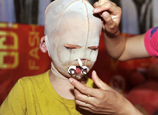
"I feel I'm closer to my dream of being a teacher and I'm so happy about that."
These were the words of Xiao Qi (a pseudonym), when he heard that the Guangdong provincial government had lifted a ban - which now stands in every province but Guangdong - that prevented HIV carriers from becoming teachers.
Xiao received a high score in the teaching qualification exams in June last year, but the local education bureau in Jiangxi Province rejected his application when medical tests showed that he was an HIV carrier. He sued the bureau for discrimination and received 45,000 yuan ($7,275) in compensation, but didn't get the job.
Xiao is optimistic that the lifting of the ban will eventually spread nationwide, however, obstacles remain. As of October 2012, there were 492,191 people with HIV/AIDS in China, according to the Ministry of Health, but NGOs say public awareness of the disease still remains low, often leading to outright fear and resistance to the lifting of the ban.
Fierce resistance
The lifting of the ban came about after education authorities in Guangdong Province released online a draft of new health standards for teaching candidates. When the clause barring HIV carriers from teaching was exposed, critics pointed out that it was a form of discrimination.
A staff member from the office of teachers' qualification in Guangdong Province told the Global Times that they had consulted medical experts and decided to remove the clause.
When the final revision of the regulation was issued in April, the clause was removed, but education authorities then came under fire by those who claimed it would put children's health at risk. In a particularly incendiary example, a teacher surnamed He made a threatening phone call to the Equity and Justice Initiative (EJI), a Shenzhen-based NGO that had been campaigning to remove the clause. According to a report in the Nandu Daily, the teacher later apologized for his aggression, but remained adamant that HIV carriers should not be permitted to become teachers.
He is far from alone in his attitude. Some parents in particular have been vocal in their objections, particularly given a recent spate of sexual assaults on primary school students by teachers. Many teachers are also reticent.
A high school teacher surnamed Xia, in Guangzhou, told the Global Times that if HIV carriers joined her school, other teachers should be informed of their health condition so that they can prevent students from getting infected.
"If the teacher has a wound, and children cut themselves carelessly, which is often the case, there's a possibility that children could get infected without anyone knowing the teacher has HIV and raising the alert," Xia said.
However, Shen Jie, vice director with the Chinese Center for Disease Control and Prevention, told the Global Times that this risk was "very low."
"HIV isn't transmitted through routine daily activities. It's true that when blood is transferred through direct wound contact the risk of infection is high … but the chances of that happening are very low. That could happen under any circumstances, so we should consider the issue from a more scientific perspective."
Guo Bin, director of the EJI, suggested that people should not link the issue of HIV with the recent concerns over security in schools, and said that the issues should be addressed separately. He also urged parents not to attach moral labels to people who have HIV.
Employment discrimination
The legitimacy of the ban has always been questionable.
Guangdong Province put in place health requirements for teaching candidates in 2007 and revised it in 2011. Both banned HIV carriers. This stemmed from a regulation issued by the Ministry of Education in 2000, which stipulated that teachers should have no infectious diseases.
However, this is at odds with employment laws, as well as laws on the prevention and treatment of HIV/AIDS. These laws stipulate that employers should not refuse to hire a pathogen carrier of an infectious disease, using his or her disease as a pretext.
The contradictory laws have created a legal vacuum. Han Chengxiang, a researcher with Nanjing Tianxiagong (justice for all), an NGO that has helped HIV carriers file four lawsuits over employment discrimination, including Xiao Qi's case, told the Global Times that HIV carriers have slim odds of victory in these cases.
"The laws are controversial and the public often holds a discriminatory mentality toward HIV carriers," Han said. "This encourages the courts to make conservative judgments."
Xia Donghua, a program director with Marie Stopes International, an NGO that deals with HIV/AIDS prevention, told the Global Times that there are three main kinds of discrimination against HIV carriers. "The first is an institutional one, for example, health standards for teachers or civil servants."
"The second results from the public's lack of knowledge of the disease," Xia said. "And the third is a cultural one, which labels HIV carriers or AIDS patients as a group outside mainstream culture."
Government prejudice?
Han said that often, there aren't specific health standards for teachers, so instead the standards for civil service candidates - which ban HIV carriers - are applied, leading to institutional discrimination.
Guo echoed Han's opinion that government agencies, public institutions and State-owned enterprises are the main bodies contributing to this discrimination. "Restricted by laws, companies are forbidden to impose HIV tests on potential employees," Guo said. "But health regulations for potential employees of government-owned bodies still have clauses banning HIV carriers. Government departments are those who discriminate against HIV carriers."
Both Guo and Han cited the successful performance the government has achieved in combating discrimination against hepatitis B carriers and said they hope the same could happen for HIV carriers. Nanjing Tianxiagong has sent letters to the other 31 regions, provinces and municipalities urging them to follow Guangdong's example.
"The key to removing discrimination against HIV carriers is protecting their privacy rights," Guo said. "Compulsory HIV tests should be abolished," Han said.
Han still has concerns about the implementation of Guangdong's new regulation, because it did not specifically stipulate that compulsory HIV tests should be abolished. "HIV tests may still be kept, with employers using other pretexts to refuse HIV carriers' applications." Han said.
Xiao now works as a clerk for a company in Jiangxi. He said that in the private sector, hardly anybody forces employees to take HIV tests.
















 Photo story: Mask girl's hard life
Photo story: Mask girl's hard life


![]()
